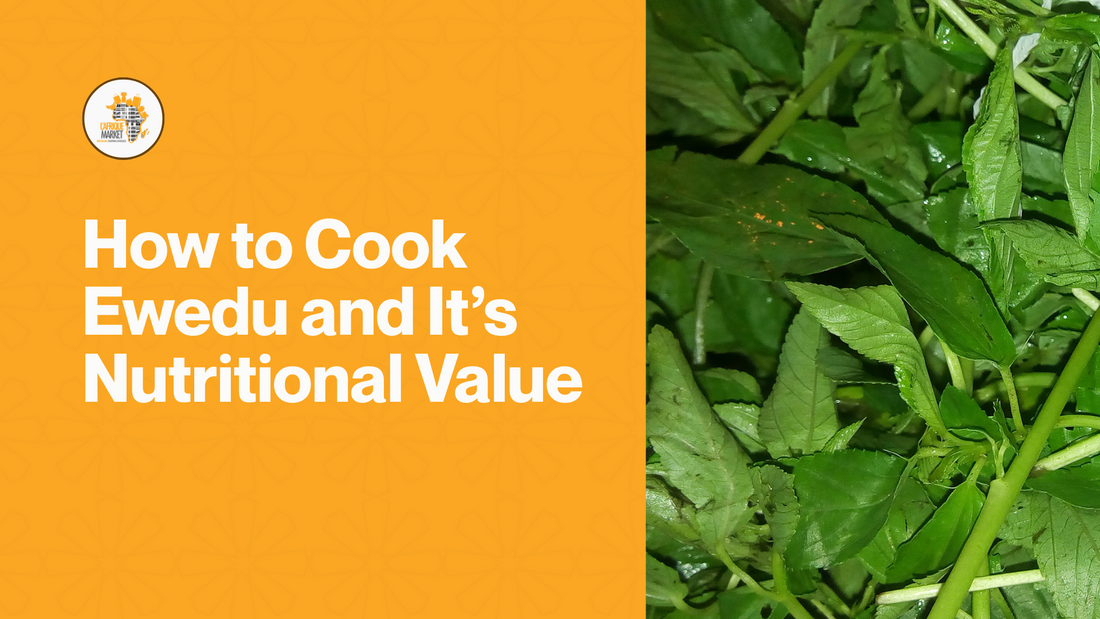
How to Cook Ewedu and It’s Nutritional Value
Share
If you're Nigerian, especially Yoruba, there's a good chance you've eaten Ewedu more times than you can count — that rich, green, slippery soup that glides down your throat alongside Amala and stew. But while most people just enjoy it for its flavor or texture, Ewedu (jute leaves) are far more than a side dish.
They are a superfood.
Yes, really.
In this blog, we’ll explore what makes Ewedu one of the most nutrient-dense vegetables in African cuisine, why it deserves a permanent place in your kitchen, and how to prepare it properly.
Also Read: 10 Household Essentials You Didn’t Know L’Afrique Sells

Image from: Proveg International
So… What Exactly Is Ewedu?
Ewedu is the Yoruba name for jute leaves, scientifically known as Corchorus olitorius. Though often eaten for its mucilaginous (slippery) texture, it's also packed with vital nutrients and medicinal properties that most people completely overlook.
Other names include: "Molokhia" in Egypt and the Middle East "Rama" in Hausa "Ayoyo" in Ghana
These leaves are widely grown in tropical climates and have been consumed for centuries across Africa, Asia, and the Middle East not just for food, but as natural medicine.

Image from: The Guardian
Medicinal & Health Benefits of Ewedu (Jute Leaves)
1. Improves Digestion
That slimy texture you either love or avoid? It's mucilage — and it works wonders for your digestive system. It helps ease bowel movement, prevents constipation, and soothes the lining of your stomach.
2. Anti-inflammatory Properties
Ewedu contains vitamin E and omega-3 fatty acids that naturally reduce inflammation. It’s often recommended for managing joint pain, arthritis, and inflammatory bowel diseases.
3. Boosts Immunity
Rich in vitamins A, C, and E, it supports your body’s defense system, helps in tissue repair, and protects against cellular damage.
4. Regulates Blood Pressure
The high level of potassium and magnesium in Ewedu supports healthy blood pressure and heart function. It also reduces the risk of stroke and cardiovascular issues.
5. Promotes Skin and Hair Health
Due to its antioxidant content, Ewedu helps improve skin elasticity and hydration. Many traditional African skincare routines even include Ewedu leaf extract for clearer skin.
6. Supports Weight Loss & Metabolism
Ewedu is very low in calories but high in fiber — helping you feel full longer, regulate blood sugar, and reduce cravings.
7. Aids Fertility
Traditionally, Ewedu has been consumed to support reproductive health in women. It contains plant estrogens and folate, which can be beneficial for hormonal balance and pregnancy preparation.
Where Can You Buy Ewedu in the U.S.?
While it may be tough to find in local stores, L’Afrique Market stocks both frozen and dried Jute Leaves, carefully selected and packaged for those of us craving a taste of home.
How to Prepare Ewedu Soup
Ingredients:
- 1 cup fresh or frozen jute leaves (or soaked dried leaves)
- 1/2 tsp Iru (locust beans)
- 1/2 tsp potash or kaun (optional for enhanced sliminess)
- Salt and bouillon cubes (Maggi or Knorr)
- Water
Directions:
- If using dried leaves, soak in warm water until soft.
- Boil a cup of water in a pot. Add potash.
- Add the leaves and cook for 5–7 minutes until soft.
- Add salt, bouillon cubes, and iru.
- Use a blender or traditional broom whisk (ijabe) to blend the leaves into a smooth consistency.
- Let simmer for 3–5 more minutes.
It’s done!
Pour it over Amala, Semo or even rice and thank us later.

Image from: Shopbee
Pair Ewedu Like a Pro
You haven’t really enjoyed Ewedu until you pair it with: Amala and Gbegiri (bean soup), Stew with assorted meats, Semo, Pounded Yam, or Fufu
Add stockfish, cow tripe, goat meat, and you’ve got a rich, protein-packed plate that satisfies the soul.
Similar Dishes Across Cultures
Ewedu is part of a broader tradition, In Egypt, Molokhia is prepared with garlic and lemon juice, served with rice and chicken. In Sudan, jute leaves are made into a stew served with kisra. In Ghana, Ayoyo is eaten with tuo zaafi.
Every country has its version, but the health benefits remain the same.
Final Thoughts: A Leaf Worth Celebrating
Ewedu isn’t just a side dish, it’s a wellness tool, a cultural symbol, and a delicious reminder of home.
So the next time you're preparing your weekly meals or looking for new soups to try, don’t sleep on this green powerhouse. Stock up on your jute leaves and start cooking meals that nourish your body and soul.
